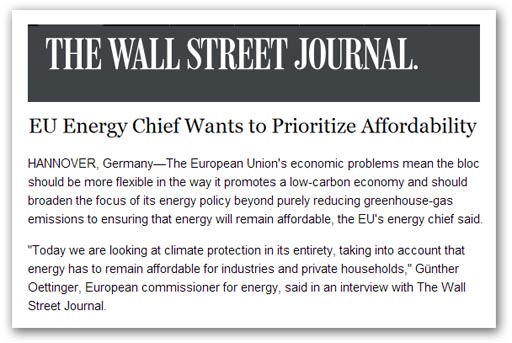Gone – or so we are led to believe – is the obsessional pursuit of a low-carbon economy. Instead, given the European Union's economic problems, there should be more flexibility: the focus of energy policy should be broadened beyond purely reducing greenhouse-gas emissions, and efforts should be made to ensure that energy remains affordable.
Thus, says Oettinger, "Today we are looking at climate protection in its entirety, taking into account that energy has to remain affordable for industries and private households".
WSJ thinks that this signals a shift in the EU's clean-energy strategy, with a bigger focus on keeping down costs to preserve the competitiveness of the bloc's economy. But, with the EU, nothing is ever quite what it seems.
Oettinger is in fact speaking to his Green Paper issued on 27 March. Entitled, "A 2030 framework for climate and energy policies", it launched a public consultation lasting until 2 July, "allowing Member States, other EU institutions and stakeholders to express their views" on climate and energy policies.
Effectively, the same sentiments were expressed at the press conference and, although the launch has been almost entirely ignored by the British legacy media, there is substantial reading in the full paper.
One finds, for instance, that the Commission is making no concessions – the longer term climate objectives are unchanged, and there is every intention that they should be met. All that seems to be happening is that the EU recognises the existence of the on-going economic crisis and is retreating into jargon.
What we are being asked to do, therefore, is "to identify how best to maximise synergies and deal with trade-offs between the objectives of competitiveness, security of energy supply and sustainability" – effectively how to achieve the targets without making it hurt so much.
But the Commission's offer is: "higher shares of renewable energy, energy efficiency improvements and better and smarter energy infrastructure". These, it says, are 'no regrets' options for transforming the EU's energy system".
As for the consultation process, there is nothing about seeking or expediting source of cheap energy. Instead, the aim of the green paper is "to consult stakeholders to obtain evidence and views to support the development of the 2030 framework".
However, since the Commission is also "consulting on issues relating to the international negotiations of a new legally binding agreement for climate action", as well as "its policy to enable the demonstration of the carbon capture and storage technology", there is little scope for change.
Crucially, there is a great deal of reliance on energy efficiency, in which smart metering and the smart grid play a central role in squaring the circle, delivering emission reductions and cost savings. In a separate paper published in 2011, the Commission estimates that energy consumption could be reduced by almost nine percent by 2020 with the use of smart grids.
Strangely, although this is our government talking, its fantasies are being allowed to multiply without critical review, not least the belief that 80 percent of all electricity meters will be replaced by smart meters by 2020 – less than six years.
Nothing, therefore, has actually changed. The same obsessions stand, and the same fantasy solutions are proposed as we hurtle towards destruction.
COMMENT THREAD
